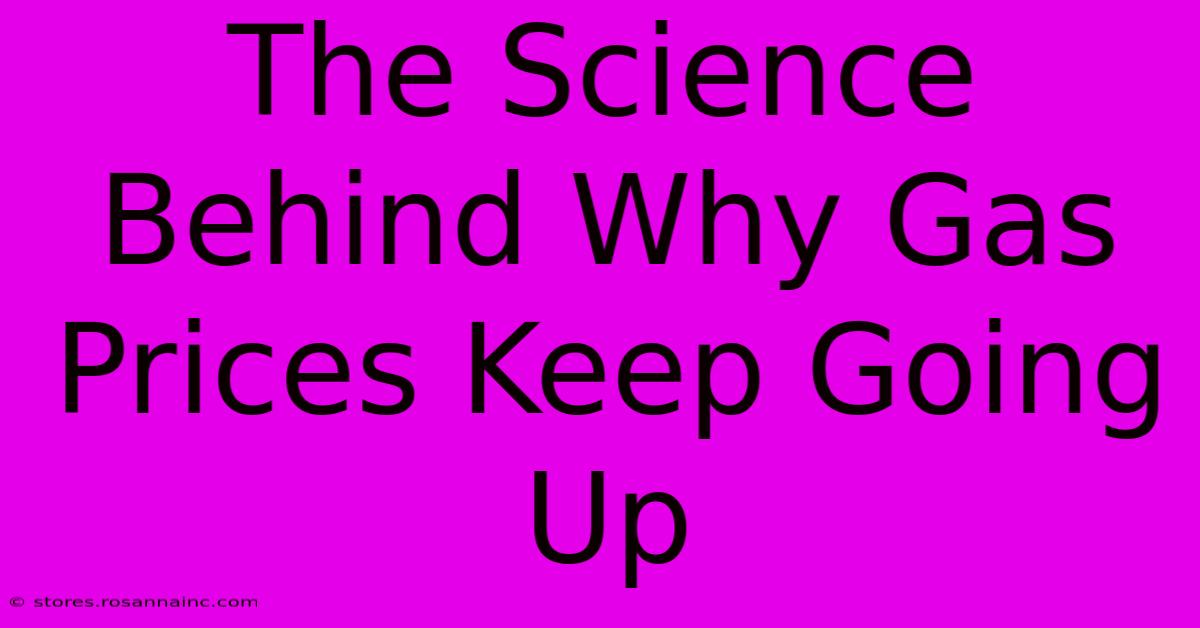The Science Behind Why Gas Prices Keep Going Up

Table of Contents
The Science Behind Why Gas Prices Keep Going Up
Gas prices. That seemingly ever-fluctuating number that impacts our wallets and our daily lives. But what's really behind those price increases? It's not just random fluctuations; there's a complex interplay of scientific, economic, and geopolitical factors at play. Understanding these elements is key to navigating the often-frustrating world of fuel costs.
The Crude Reality: Oil Production and Supply
At the heart of it all is crude oil. The price of crude oil is the single biggest factor influencing gas prices. Why? Because gasoline is refined from crude oil. Therefore, any change in the global supply of crude oil directly impacts the price we pay at the pump.
Factors Affecting Crude Oil Supply:
- OPEC Decisions: The Organization of the Petroleum Exporting Countries (OPEC) significantly influences global oil supply. Their decisions regarding production quotas directly affect the availability of crude oil on the world market. Reduced production, often driven by geopolitical considerations or internal disagreements, leads to higher prices.
- Geopolitical Instability: Conflicts, political unrest, and sanctions in oil-producing regions can disrupt supply chains and lead to price spikes. Think of the impact of wars or sanctions on oil-rich nations. These events create uncertainty and reduce the available supply.
- Natural Disasters: Hurricanes, earthquakes, and other natural disasters can damage oil infrastructure, disrupting production and transportation, subsequently driving up prices. This is a factor outside of direct human control.
- Technological Advancements (and lack thereof): Advances in oil extraction technologies (like fracking) can increase supply and potentially lower prices. However, a lack of investment in new technologies or delays in infrastructure development can constrain supply and push prices upward.
Refining and Distribution: The Journey to Your Tank
Once crude oil is extracted, it undergoes a complex refining process to produce various petroleum products, including gasoline. The cost of refining, transportation, and distribution all contribute to the final price at the pump.
Costs Involved in Refining and Distribution:
- Refinery Capacity: Limited refinery capacity can constrain the amount of gasoline that can be produced, leading to price increases during periods of high demand.
- Transportation Costs: The cost of transporting crude oil and refined gasoline from refineries to gas stations is influenced by fuel prices themselves, creating a feedback loop. Higher fuel prices increase transportation costs, which in turn increase gas prices.
- Seasonal Variations: Demand for gasoline tends to be higher during summer months (road trips!), leading to potentially higher prices. This is a predictable seasonal fluctuation.
Market Forces: Supply and Demand Dynamics
The basic principles of supply and demand heavily influence gas prices. High demand coupled with limited supply inevitably leads to price increases. Conversely, lower demand or increased supply can lead to lower prices.
Factors Affecting Demand:
- Economic Growth: Strong economic growth usually translates into higher demand for gasoline as people drive more.
- Consumer Behavior: Changes in consumer driving habits, such as increased fuel efficiency in vehicles, can affect overall demand.
- Alternative Fuels: The growing adoption of electric vehicles and other alternative fuel sources could, in the long run, decrease the demand for gasoline and potentially lower prices.
Beyond the Basics: Taxation and Speculation
Gas prices are also influenced by government taxes and speculation in the oil futures market.
- Taxes: Federal, state, and local taxes add to the price of gasoline, varying significantly across different regions.
- Speculation: Trading in oil futures contracts can contribute to price volatility. Speculators bet on future price movements, potentially driving prices up or down depending on their collective actions.
In conclusion, understanding the science behind rising gas prices is not simply about memorizing facts and figures. It's about grasping the interconnectedness of global events, economic principles, and technological advancements. By comprehending these factors, we can better anticipate price fluctuations and make more informed decisions about our fuel consumption and transportation choices.

Thank you for visiting our website wich cover about The Science Behind Why Gas Prices Keep Going Up. We hope the information provided has been useful to you. Feel free to contact us if you have any questions or need further assistance. See you next time and dont miss to bookmark.
Featured Posts
-
The Celtic Connection Uniting The Past And Present Through Knots
Feb 05, 2025
-
Elevate Your Design Palette With The Pastel Perfection Of Soft Ballet Pink
Feb 05, 2025
-
Por Que Sigues Invirtiendo En Fracasos La Falacia Del Costo Hundido Revelada
Feb 05, 2025
-
Googles Secret Weapon For Vba Word Redaction Mastery Revealed In This Guide
Feb 05, 2025
-
Hoard A Kings Ransom Unveiling The Secrets Of Medieval Woodcut Currency
Feb 05, 2025
